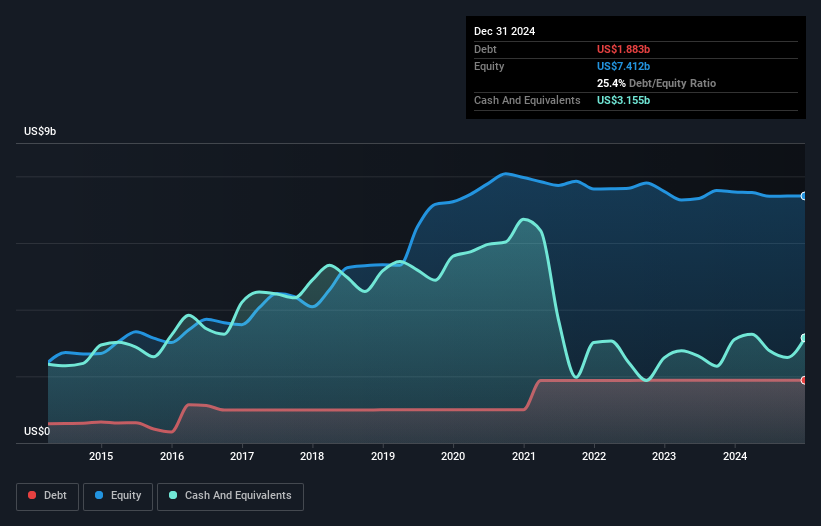Warren Buffett famously said, 'Volatility is far from synonymous with risk.' So it seems the smart money knows that debt - which is usually involved in bankruptcies - is a very important factor, when you assess how risky a company is. Importantly, Electronic Arts Inc. (NASDAQ:EA) does carry debt. But the more important question is: how much risk is that debt creating?
When Is Debt Dangerous?
Debt is a tool to help businesses grow, but if a business is incapable of paying off its lenders, then it exists at their mercy. Part and parcel of capitalism is the process of 'creative destruction' where failed businesses are mercilessly liquidated by their bankers. However, a more common (but still painful) scenario is that it has to raise new equity capital at a low price, thus permanently diluting shareholders. Of course, plenty of companies use debt to fund growth, without any negative consequences. When we examine debt levels, we first consider both cash and debt levels, together.
What Is Electronic Arts's Net Debt?
The chart below, which you can click on for greater detail, shows that Electronic Arts had US$1.88b in debt in December 2024; about the same as the year before. However, its balance sheet shows it holds US$3.16b in cash, so it actually has US$1.27b net cash.

How Healthy Is Electronic Arts' Balance Sheet?
According to the last reported balance sheet, Electronic Arts had liabilities of US$3.10b due within 12 months, and liabilities of US$2.94b due beyond 12 months. Offsetting these obligations, it had cash of US$3.16b as well as receivables valued at US$742.0m due within 12 months. So its liabilities total US$2.14b more than the combination of its cash and short-term receivables.
Since publicly traded Electronic Arts shares are worth a very impressive total of US$37.6b, it seems unlikely that this level of liabilities would be a major threat. Having said that, it's clear that we should continue to monitor its balance sheet, lest it change for the worse. Despite its noteworthy liabilities, Electronic Arts boasts net cash, so it's fair to say it does not have a heavy debt load!
Check out our latest analysis for Electronic Arts
On the other hand, Electronic Arts saw its EBIT drop by 4.6% in the last twelve months. If earnings continue to decline at that rate the company may have increasing difficulty managing its debt load. When analysing debt levels, the balance sheet is the obvious place to start. But it is future earnings, more than anything, that will determine Electronic Arts's ability to maintain a healthy balance sheet going forward. So if you want to see what the professionals think, you might find this free report on analyst profit forecasts to be interesting.
Finally, a business needs free cash flow to pay off debt; accounting profits just don't cut it. While Electronic Arts has net cash on its balance sheet, it's still worth taking a look at its ability to convert earnings before interest and tax (EBIT) to free cash flow, to help us understand how quickly it is building (or eroding) that cash balance. Happily for any shareholders, Electronic Arts actually produced more free cash flow than EBIT over the last three years. That sort of strong cash conversion gets us as excited as the crowd when the beat drops at a Daft Punk concert.
Summing Up
We could understand if investors are concerned about Electronic Arts's liabilities, but we can be reassured by the fact it has has net cash of US$1.27b. The cherry on top was that in converted 110% of that EBIT to free cash flow, bringing in US$1.9b. So we don't think Electronic Arts's use of debt is risky. Above most other metrics, we think its important to track how fast earnings per share is growing, if at all. If you've also come to that realization, you're in luck, because today you can view this interactive graph of Electronic Arts's earnings per share history for free.
If you're interested in investing in businesses that can grow profits without the burden of debt, then check out this free list of growing businesses that have net cash on the balance sheet.
Valuation is complex, but we're here to simplify it.
Discover if Electronic Arts might be undervalued or overvalued with our detailed analysis, featuring fair value estimates, potential risks, dividends, insider trades, and its financial condition.
Access Free AnalysisHave feedback on this article? Concerned about the content? Get in touch with us directly. Alternatively, email editorial-team (at) simplywallst.com.
This article by Simply Wall St is general in nature. We provide commentary based on historical data and analyst forecasts only using an unbiased methodology and our articles are not intended to be financial advice. It does not constitute a recommendation to buy or sell any stock, and does not take account of your objectives, or your financial situation. We aim to bring you long-term focused analysis driven by fundamental data. Note that our analysis may not factor in the latest price-sensitive company announcements or qualitative material. Simply Wall St has no position in any stocks mentioned.
About NasdaqGS:EA
Electronic Arts
Develops, markets, publishes, and delivers games, content, and services for game consoles, PCs, and mobile phones worldwide.
Adequate balance sheet with moderate growth potential.
Similar Companies
Market Insights
Community Narratives



